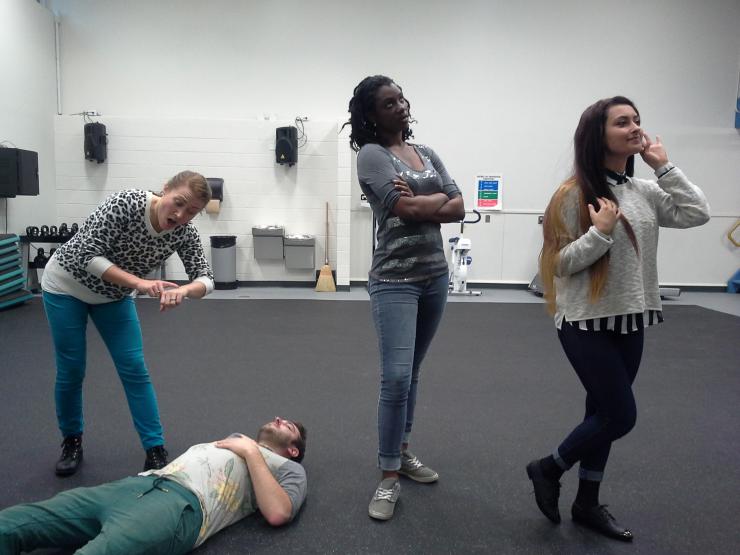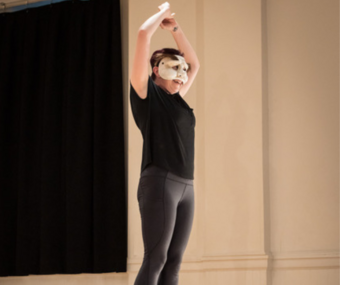Liquid Attitudes
Actor Training and the Contradictions of Capitalism
But the director will give us our choices.
I am paraphrasing this from a young man I participated in an Alexander Technique workshop with recently in New York City. I cannot quote him directly, but this is what I managed to scribble in my notebook before we all bounded to our feet for another round of practice exercises. But this is, at the very least, a fair version of what he said.
The young man in question was a freshly minted acting BFA from one of the New York University conservatories, and he certainly fit the mold. Slight, dark hair, face artfully stubbled, he seemed to have been sent by central casting to fill the role of “young aspiring actor in New York.” No doubt he was superbly trained and very savvy.
However, his comment struck me like a clout on the ear. Here was a young man who had seemingly every advantage the American theatre could give him (“right” body type, “right” training, graduation from a prestigious program...) but he balked at doing one of the most basic things an actor is called upon to do, and that is to “make interesting choices.” It seems that we had an exquisitely engineered puppet, the ubermarionette that Edward Gordon Craig always dreamed of, “There is only one actor—nay one man who has the soul of the dramatic poet, and who has ever served as the true and loyal interpreter of the poet,” Craig wrote, and “this is the marionette.” Our young man seemed resigned, if not content, to cede a basic element of artistry to somebody else.
For a long time I have firmly believed (and have taught my students) that acting really only comprises three basic things. Those are:
Move so you can be seen.
Speak so you can be heard.
Make interesting choices.
And the rest is details. Now, admittedly, each of those things can be unpacked and examined in depth for both meaning and technique. But, at the end of the day, an actor must be capable of doing those things. And yet, our young man was going to cede a full third of his responsibility (as well as a third of his joy) to the director. Yet try as I might, I have difficulty fathoming why.
I recall speaking with another young actor who told me that she was not paid to have opinions. She had not yet even been cast in the project we were discussing. She sought, I imagine, to neutralize her own opinions in order to mimic (or even internalize) the assumed “correct" opinions of the gatekeepers on that particular project in the hopes of unlocking an opportunity for participation.
What would possess these two young people to seek such neutralization? In her book And Then, You Act, Anne Bogart encourages artists to have an attitude. “Acting is the dynamic play of extending out and receiving back: will and grace.” Striving to be without attitude, one is purely receptive, is not reaching out. So why banish a part of themselves? That answer is quite simply, commodification. A commodity is a market item that is fungible, or readily exchangeable for an identical item. A barrel of oil is essentially a barrel of oil. One is very much like the other, and they are literally interchangeable. In trying to render themselves marketable, actors today go through the commodification process.
The ultimate commodity is, of course, money. A dollar can be turned into almost anything: a cup of coffee, a haircut, a calendar, or a few moments of attention from a stripper. The possibilities are limitless. Given enough liquidity, there are essentially no checks upon our desires (the excesses of various speculators, from Dennis Kozlowski to Martin Shkreli should provide ample examples of this). Given enough liquidity, you may even be able to buy an election.
Under our current system, we must accept that the market is oversaturated with actors. And so, students are graduating into a professional pool that has no inherent interest in them joining and is already overcrowded as it is.
Here we come to one of the inherent conflicts in American actor training, a conflict which causes our meticulously trained actors to withdraw from one of the basic elements of acting. It is also one of the perils of studying and teaching acting in a late capitalist system.
Under our current system, we must accept that the market is oversaturated with actors. And so, students are graduating into a professional pool that has no inherent interest in them joining and is already overcrowded as it is. This leads to all manner of abuses, from low/no wage work, paying in “exposure,” and other exploitative work practices. When supply massively outstrips demand, the value of the work provided is so low that it cannot, in itself, make any demands in terms of the conditions of employment. The cliché is, “If you don’t like it, there are a dozen more just like you.”
This is the reality of the market, we groan with a shrug. It is reality, and nobody has yet to come up with a better system. The acting teachers add a chorus of “Well what are we supposed to do?” to the general lamentation. There just aren't enough jobs, and yet we keep moving young people through our conservatories.
The true perversity of the situation, however, stems not from the fact that we keep the system running, but instead from the situation itself. The very structure of capitalism, and the fact that we treat it as a given, provides the spur to encourage these young people to keep pressing forward into the already overfull pool. Jean Baudrillard, in discussing the philosophical figure of the obese in his Fatal Strategies, writes “these obese people are fascinating for their total oblivion to seduction... They claim a sort of truth, and in fact they do display something of the system, of its empty inflation” (Baudrillard 27). We should note here that Baudrillard does not speak of any form of physical obesity, but instead of a metaphysical condition. A condition where the institution has grown so much that it doesn't merely dominate the system, but on some level has become synonymous with the system. Its authority has gone from simple dominance to inescapably hegemonic. The city has become synonymous with the sprawling metropolis. Hypertrophied, it is immune to seduction because it cannot even be said to have an object. It simply is.
We tend to ignore the fact that market capitalism is an ideology like any other, with all of the same fantasies. Though commonly considered to be purely pragmatic and scientifically hard-nosed, not prone to fantasy. However, Slavoj Žižek, in his First as Tragedy, Then as Farce, writes that “This description is... patently untrue: if there was ever a system which enchanted its subjects with dreams (of freedom, of how your success depends on yourself, of the run of luck which is just around the corner, of unconstrained pleasures...), then it is capitalism” (Žižek 36). Žižek points directly to the issue, the fantasies of capitalist ideology blind us to its limitations.
The ideal of the self-made man, of Ragged Dick and Andrew Carnegie, who began with little to nothing and then rose in society (to middle-class respectability in the first case, to the heights of monopolistic power in the second) is one of capitalism's most-beloved stories. It is based on the idea that you, the individual, are solely in control of your success. We can see this also in numerous keynotes at theatre conferences. Almost invariably, it seems, there is somebody who moved to New York and had a solidly paying job the next day. That these stories are unusual, and therefore worth telling, seems to escape us. And so, despite the oversaturated market, actors continue to pour in because, by heavens, they are different from the others. They are going to be the ones that make it. They are going to have a career. In traditional Žižek style, the capitalist ideology has become a way of using some form of fantasy to order your reality.
Interestingly, it is these young people's belief (even if unconscious) in their exceptionality that leads them to commodify themselves. They are faced with a paradox where they must render themselves interchangeable in order to achieve what the others will not.
If the system is so dysfunctional (and I am not the only one to point out that it is: see here, here, here, and here), why do we keep it running? Why continue to train actors for such a market? To ascribe cynicism to the teachers and schools (i.e., they only do it so they can stay in business themselves and collect their salaries) feels a little too simplistic. After all, the self-interest of the professoriat is not served by this oversaturation. Assuming logical self-interest calculations (one of the hallmarks of the capitalist system's conception of itself) enrollment would decline and they would find themselves retrenched out of a job, and tenure be damned.
However, such ceaseless, almost frenetic, activity is built into the very structure of consumer-driven capitalism. Žižek points to the ponzi scheme of Bernie Madoff as a perfect example of this. Given Madoff's business acumen, it is not as if he did not understand what would happen when the system shut down. However, this sort of development is the logical extent of the capitalist system. It grows until it metastasizes. How else do we account for the consensus that something isn't quite right with our theatre education system, but its continued activity?
One might argue that examples like Bernie Madoff and the two young actors I reference above are simply “bad apples.” However, I would submit that the extremity of their situations provides a pure example of what the system can create. It is the logical extremity of the foundation on which the system is built.
As a student and practitioner of the Alexander Technique, I am reminded of something F. M. Alexander referred to as “End Gaining.” When faced with improper use of the self, the student (Alexander resisted the term “patient”), would often try to “fix what was wrong.” In essence, if posture was the problem, they would try “to stand up straight.” Given the student's already unreliable sensory mechanism, their attempt to gain the end would either be nonproductive or, possibly, harmful. Instead, Alexander suggested focusing on the “means whereby.” By focusing on the steps, and with the assistance of a skilled teacher, proper use can be restored and the system returned to proper and optimal functioning.
But there is no business like show business! It is, admittedly, difficult to focus on the “means whereby” when the tempting objective of a career laced with fame and adoration (no matter how illusory or unlikely) is hanging in the air. The call of the industry is downright seductive as an object. Baudrillard asserts that the seductive object (and only an object can seduce, a subject can only desire) is that which has passed “through the absolution and resolution of its own desire” (Baudrillard 120). Given that “the industry” wants nothing, exists in an overflow of labor, it cannot help but seduce the subject. It thus encourages the student to ignore the “means whereby” and focus on gaining the end.

We need to not only train our students in the needed skills, but we also need to start teaching them ways to seize the means of production for themselves.
In my head, I call this the “studio-industrial complex.” Young people pour into major markets because they have been told that this is how to get a career. They commodify themselves to “get their foot in the door.” In essence, they work in order to pursue more permission to do their thing. The gatekeepers of the studios and conservatories, benefiting from the inexpensive labor provided, have little interest in changing it.
This puts the responsibility to try and break out of this swollen system at the feet of educators. We need to not only train our students in the needed skills, but we also need to start teaching them ways to seize the means of production for themselves. How can they be empowered to reach out directly and contact the audience on their own terms? How can we get them to focus on the means whereby? In this, we will find a healthy future for theatre education. We will find a way to cultivate the attitude of a future generation of artists and keep them from becoming mere liquid commodities.
Works Cited
Baudrilliard, Jean. Fatal Strategies. Cambridge, MA: Semiotext(e), 2008.
Žižek, Slavoj. First as Tragedy, Then as Farce. London: Verso Books, 2009.










Comments
The article is just the start of the conversation—we want to know what you think about this subject, too! HowlRound is a space for knowledge-sharing, and we welcome spirited, thoughtful, and on-topic dialogue. Find our full comments policy here
This is a great and complex article Eric. Having worked in and working within many industries, I do believe some of this has to do with simply being at the start of a career and still finding footing. The majority of the rest of the professional population has some path toward continuous employment in their field right out of training. Those first few years serve as an apprenticeship of sorts. They are a way to put to work what they learned and become confident enough in their abilities to make decisions. Most actors don't get that chance.
When working with young actors, the think I ask the most is, aside from the work we’re doing to ready you for your career, what are you doing to practice your craft. Those who are thriving are doing just what you suggest, finding ways to make art and an audience.
The part of your article that really struck me however was earlier on:
“For a long time I have firmly believed (and have taught my students) that acting really only comprises three basic things. Those are:
Move so you can be seen.
Speak so you can be heard.
Make interesting choices.
And the rest is details. Now, admittedly, each of those things can be unpacked and examined in depth for both meaning and technique. But, at the end of the day, an actor must be capable of doing those things.”
One of the things I find consistently in both recently minted and (unfortunately) in established artists on stage and screen, is the inability to be move and speak effortlessly. What do I mean by this? I’m watching artists who are so locked in patterns they have not been shown how to break that they are not able to tell any story they choose without damaging their instruments (this includes incredible dancers and amazing “physical” actors). I’m treating those with vocal injuries because vocal techniques are layered onto physically disorganized bodies, creating compensation patterns and repetitive use injuries. And I’m seeing and listening to this underlying story that it just hurts to do the job. That it is inevitable that with an acting career comes an exhausted body and a voice that will only sustain through so many decades. None of this needs to be. But it also addresses some of that question of choices. When we have fewer physical/vocal choices, when it is more (even subconscious) mental work to simply move and speak, when our body is disorganized and requires more effort to function, we have less mental capacity to do anything cognitive or creative.
I would love for you to write some companion articles to address those issues. And in my dreams, we one day get a company of actors who we retrain to be effortless (and who have the tools to maintain that for 50, 60, 70 years!) – and then we see what stories they are empowered to tell.
The thing is, even in terms of other professions, young professionals are being asked for this attitudinal liquidity as a way of commodifying themselves. As was mentioned in Rob Horning's "Marginal Utility" blog over at The New Inquiry, not only must they do the work, they must act as if they want to. They must act as if there were a higher mission. In reality, the budding accountant is no better off.
But I am in complete agreement with you in regards to physical and vocal limitations. After watching students with no real sense of their bodies in space (and contorting themselves to try and do the impossible) I started making serious study of the Alexander Technique. I can already see a very substantial difference in students.
I agree on the higher mission piece - and budding accountants are no better off because their "higher" mission has to do with learning the bigger pieces of the puzzle for their team or clientele, things that simply can only be taught to a certain degree in theory and have to be learned "on-the-job."
As for the bodies in space, I would love to continue that conversation. Including the concepts of "release" and what tension means and what is going so terribly wrong when we encourage release work and only look at tension as a bad thing! Please reach out if you are up for that?!
In my experience, discussions of "tension" and "release," don't particularly work. Kathy Madden actually posits that telling an actor to "relax" is one of the worst things you can tell them. What I have found in working with my students is that a direct approach is, in some ways, the least effective.